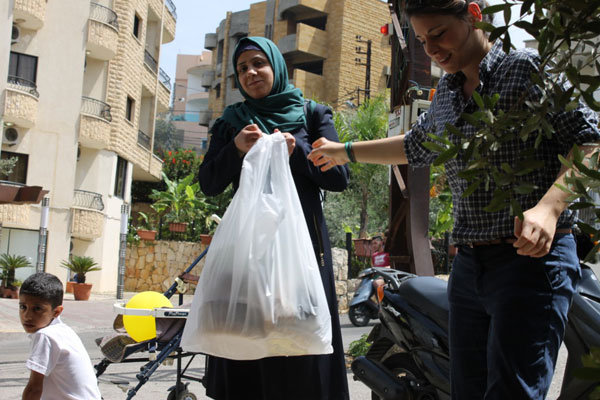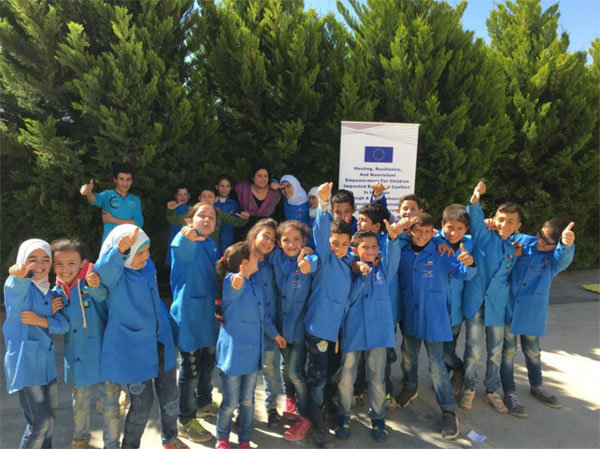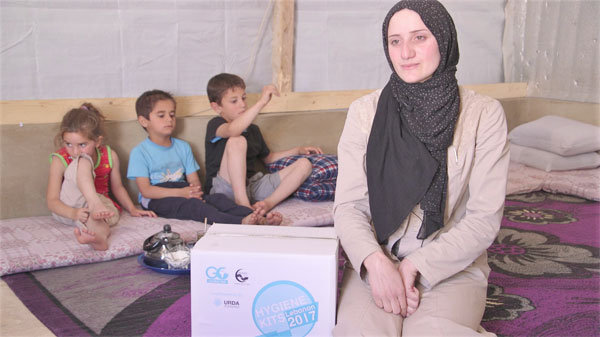By Britt Lake | Chief Program Officer
This fall, the number of Syrian refugees registered with the UNHCR climbed to an all-time high of 5.3 million, with more than 450,000 people living in camps. While the Islamic State has seen its hold on Syrian territory slip away in recent months, fighting between government and opposition forces has continued, leading to even more civilians seeking safety outside of Syria.
Since our last update, your generous donations have supported 57 projects by 46 of our vetted nonprofit partners in 12 countries. In response to the massive scope of the crisis, you've helped to fund a wide range of relief work, from emergency assistance to families who've just fled the violence in Syria to holistic support for long-term residents of sprawling refugee camps in the Middle East and Europe.
You can read project reports from all of our partners assisting Syrian refugees on our website, but today I'd like highlight three high-impact projects, each based in the same country but tackling three different challenges facing refugees, that you've helped fund in 2017.
In Lebanon, a country of six million residents and currently home to more than a million Syrian refugees, employment opportunities for refugees are scarce and often risky. Because of their legal status, it's not uncommon for refugees to go unpaid for their work or be denied workplace rights afforded to Lebanese citizens. For many refugee families, this economic insecurity leads to food insecurity. Gruppo Aleimar Onlus, an Italian NGO working in the outskirts of Beirut, runs several community kitchens and thanks to support from GlobalGiving donors like you, has been able to expand their meals program from two to four days a week, and are now providing 4,800 free, nutritious meals each month to families in need.
The psychological toll of being forced to leave your old life behind in search of a safe haven may not be immediately visible but cannot be ignored. Staff from the International Association for Human Values in Tripoli, Lebanon are addressing this issue by reaching out to the large refugee community in and around the city and offering free psychosocial support. They've run 23 stress relief and resilience workshops for 775 children so far this year, and are planning to expand the program to reach 6,000 children and 1,500 parents and caregivers over the next three years. Responses from the children participating in the workshops, which you can read more of in a recent project report, have been really touching. Hassan, a fourth-grade boy, said he was thankful for the workshops because now, in his words, "I don't beat my friends or get angry with them. Even whenever I get angry then I do the breathing then I make up with them and love them all my life."
Under the best of circumstances, the experience of childbirth is no walk in the park—just ask any mother. In a refugee camp, where there is often no access to maternal and neonatal care, the ordeal can become especially traumatic. With 41% of Syrian refugee households in Lebanon having an expecting or new mother, Global One 2015 has launched a program they’re calling Box for Life to improve maternal and infant health. While it's modeled on the well-known baby box distributed to all new mothers in Finland, the Box for Life is tailored to the needs of mothers and children living in refugee camps. It includes essential items like nutritional and oral rehydration supplements, reusable diapers, breastfeeding supplements, sanitary pads and an insect net. The box itself doubles as a crib for newborns. Global One 2015's first Box of Life distribution is happening this month, with 115 new and expecting mothers receiving kits. The organization has also begun training 10 women in basic midwifery skills and another 10 women in sewing reusable diapers.
These are just three of the myriad stories your support has made possible, from just one of the 12 countries where our partners are currently operating. As I mentioned earlier, you can read all the project reports from our partners responding to the Syrian refugee crisis on our website. If you do, I think you’ll be inspired by the depth and breadth of the vital relief work that’s been done and is still underway.
I'll be back in your inbox in January to share a new update on the progress being made. Until then, thank you again for your generous support.
Warmly,
Britt Lake + the GlobalGiving Team
Project reports on GlobalGiving are posted directly to globalgiving.org by Project Leaders as they are completed, generally every 3-4 months. To protect the integrity of these documents, GlobalGiving does not alter them; therefore you may find some language or formatting issues.
If you donate to this project or have donated to this project, you can receive an email when this project posts a report. You can also subscribe for reports without donating.
When a disaster strikes, recovery efforts led by people who live and work in affected communities are often overlooked and underfunded. GlobalGiving is changing this reality. Since 2004, we've been shifting decision-making power to crises-affected communities through trust-based grantmaking and support.
We make it easy, quick, and safe to support people on the ground who understand needs in their communities better than anyone else.
They were there long before the news cameras arrived, and they’ll be there long after the cameras leave. They know how to make their communities more resilient to future disasters, and they’re already hard at work. GlobalGiving puts donations and grants directly into their hands. Because the status quo—which gives the vast majority of funding to a few large organizations—doesn’t make sense.
Questions about this project? Contact us
Support this important cause by creating a personalized fundraising page.
Start a Fundraiser

